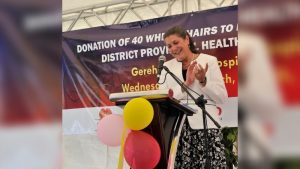On Wednesday, the Taipei Economic and Cultural Office (TECO) and the United States Agency for International Development (USAID) partnered with Papua New Guinea’s (PNG) National Department of Health (NDoH) to improve access to health for persons with disabilities.
TECO donated 40 wheelchairs to the NDoH, while USAID supported the distribution to 11 health facilities in Port Moresby’s National Capital District (NCD). This wheelchair donation supports PNG’s National Health Plan 2021-2030 and the country’s goals to increase access to health services for people with disabilities.
Representative Liao thanked the U.S. Embassy in Port Moresby for its assistance in coordinating with NDoH for the distribution of the wheelchairs. He also expressed his hope to continue working with the US and PNG Governments in the future to create a win-win-win situation here in PNG.
“The United States Government is pleased to partner with the Taipei Economic and Cultural officer here in PNG for greater development impact,” said U.S. Ambassador to Papua New Guinea, Vanuatu, and the Solomon Islands Erin E. McKee.

“Today’s donation creates an enabling opportunity for people living with disabilities and complements USAID programs already operating in these eleven NCD clinics.”
Dr. Steven Yennie, Chief Executive Officer, NCD PHA, said, “Though we may encounter many challenges in regards to funding and resourcing, we can be assured that our development partners stand committed to providing vital services that will contribute to the goal of better health outcomes for our city of Port Moresby and throughout the country of Papua New Guinea.”
Papua New Guinea is party to the United Nations Convention on the Rights of Persons with Disabilities (2013) and has a National Policy on Disability in place to protect those who are most vulnerable. However, there is a lack of accurate statistics about the number of men, women and children living with disabilities in Papua New Guinea.
The pandemic has exacerbated the challenges experienced by people living with disabilities, putting them at higher risk of becoming victims of the virus. The wheelchair donation will
improve the ability of people living with disabilities to access general health services, including COVID-19 treatment and vaccines.

